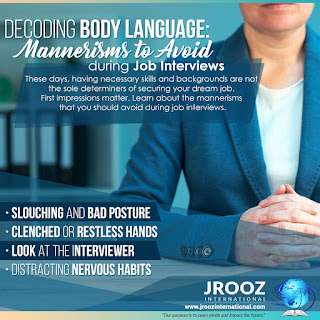Take the IELTS Test with confidence, detailed lessons, tips, full practice test and answers at Jrooz International.Our IELTS Online has everything you need.
Monday, March 27, 2017
Decoding Body Language: Mannerisms to Avoid during Job Interviews
When looking for a job in an English-speaking country, the first thing you need to do is to take the IELTS examination. Most companies overseas require their aspiring applicants to submit proof of their English competence. As one of the world’s most acknowledged language proficiency evaluations, the IELTS is your best option.
If you have a lot of commitments, the best way to review is by enrolling in IELTS online training. IELTS online coaching materials are readily available, and programs can be taken anytime, anywhere provided that you stay within the restrictions of your chosen package. IELTS online training covers all of the examination components. In fact, the IELTS online coaching sessions can help you adjust to the pressures of the high-stakes test as instructors utilize up-to-date review materials and mock exams.
Once you accomplish the IELTS test with flying colors, getting a job abroad becomes a relatively straightforward process. You look for a job, apply for the job, take the tests required by the job and submit to a job interview. Most job seekers buckle when they reach stage four of the application procedure.
Interviews are the most nerve-wracking part of any job application. Potential employers nitpick not just your every word but also your every movement. It does not matter if your answers are all on-point or if your overqualified for the post. If the facilitator finds something off-putting about your body language during the interview, you will most likely not get the job.
Prevent this disaster by avoiding the following mannerisms during your job interviews:
Slouching and bad posture
Did you know that employers are already observing you from the moment you went inside the interview room? So make sure that you make a good impression starting with your posture. Do not hunch forward when you walk and stand. Keep your back straight when you stand, walk and sit. Slouching in your seat reflects boredom and disinterest.
Clenched or restless hands
People have their own ways of dealing with nervousness and anxiety when it comes to hand mannerisms. Some clench their hands on their laps—rigid and in control—while others could not keep their hands still—their nervous energy spilling into their movements. Be aware of your idiosyncrasies and keep your hands relaxed throughout the interview.
Look at the interviewer
Eye contact during the interview is a sign of interest and respect. Excessive eye contact or staring, however, is not. Experts recommend looking at the different parts of the facilitator’s face every few seconds. Another way to show your engagement to the conversation is by nodding at turning points of a topic.
Distracting nervous habits
Aside from the various hand-related nervous habits mentioned above, here are other anxiety tics that you should refrain from doing during your interview:
• Touching your face
• Scratching your head
• Biting your lips
• Jiggling your legs/feet
• Shifting in your seat
• Fidgeting with your clothes
Balance is the key to interview success. You have to be relaxed, not indifferent; show confidence, not arrogance. Consider the mannerism no-no’s mentioned above to increase your chances of securing your dream job.
Subscribe to:
Post Comments (Atom)

No comments:
Post a Comment